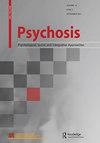提供“应对声音”小组的引导者视角(第1部分)
IF 1
4区 医学
Q4 PSYCHIATRY
Psychosis-Psychological Social and Integrative Approaches
Pub Date : 2021-09-01
DOI:10.1080/17522439.2021.1956575
引用次数: 1
摘要
背景:本多地点研究评估了一个基于群体的项目的引导者视角,该项目将精神病认知行为治疗(CBTp)的共同要素与同伴主导的听声网络(HVN)的知识和价值观结合在一起。22名小组协调员被要求完成一项包含58个项目的在线调查,以衡量“应对声音”项目的有用性、最重要的技能、好处、可接受性和有效性。方法采用开放式和封闭式问卷调查相结合的方法。封闭式问题采用描述性分析,开放式问题采用专题分析。结果大多数辅导员报告说,声音的整体正常化和一系列正常化策略的使用是该计划最有用的方面。主持人使用的最重要的技能是理解、不评判和尊重,并创造一个安全的空间来讨论话题。引导者使用的最不重要的技巧是使用个人披露和动机性访谈。主持人的评论表明,他们对在计划的准备和实施中使用数字技术有浓厚的兴趣。这项研究提供了越来越多的证据,表明听声小组是有益的、可行的和值得的。本文章由计算机程序翻译,如有差异,请以英文原文为准。
The facilitators’ perspectives of delivering a ‘Coping with Voices’ group (Part 1)
ABSTRACT Background This multi-site study evaluated facilitator perspectives of a group-based program that brings together the common elements of cognitive behaviour therapy for psychosis (CBTp) with the knowledge and values of the peer led hearing voices networks (HVN). Twenty-two group facilitators were asked to complete a 58-item online survey which measured the usefulness, most important skills, benefits, acceptability and effectiveness of the Coping with Voices program. Methods Aligning with a mixed-methods approach the survey consisted of open and closed-ended questions. The closed-ended questions were analysed using descriptive analysis and open-ended questions were analysed using thematic analysis. Results The majority of facilitators reported the overall normalisation of voices and the use of a range of normalising strategies as the most useful aspects of the program. The most important skills used by facilitators were being understanding, non-judgemental and respectful and creating a safe space to discuss topics. The least important skills used by facilitators were using personal disclosure and motivational interviewing. Facilitators’ comments illustrated a strong interest in using digital technologies in the preparation and delivery of the program. Discussion This study contributes to a growing body of evidence that suggests hearing voices groups are beneficial, feasible and worthwhile.
求助全文
通过发布文献求助,成功后即可免费获取论文全文。
去求助
来源期刊
CiteScore
2.20
自引率
8.30%
发文量
36

 求助内容:
求助内容: 应助结果提醒方式:
应助结果提醒方式:


